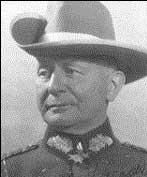Paul von Lettow-Vorbeck
From Kaiserreich
LordInsane (Talk | contribs) |
(what's that now Cameroon, apart from a portion transferred to Nigeria doing here?) |
||
| Line 14: | Line 14: | ||
Afterwards, Lettow-Vorbeck was posted in [[Africa]]. Between 1904 and 1908, he went to German South-West Africa (now [[Mittelafrika]]) to participate in the Hottentot and Herero Genocide. Lettow-Vorbeck suffered an injury to his left eye and was forced to recuperate in South Africa where he met Jan Smuts. Later he would fight against Smuts during the [[Weltkrieg]]. | Afterwards, Lettow-Vorbeck was posted in [[Africa]]. Between 1904 and 1908, he went to German South-West Africa (now [[Mittelafrika]]) to participate in the Hottentot and Herero Genocide. Lettow-Vorbeck suffered an injury to his left eye and was forced to recuperate in South Africa where he met Jan Smuts. Later he would fight against Smuts during the [[Weltkrieg]]. | ||
| - | From January 1909 until January 1913, Lettow-Vorbeck was the commander of the 2nd Sea Battalion (II. Seebataillon) of the German Marines (Kaiserliche Marine-Infanterie) at Wilhelmshaven in Lower Saxony, Germany. He also commanded the German colonial forces known as the Protection Force (Schutztruppe) in Kamerun | + | From January 1909 until January 1913, Lettow-Vorbeck was the commander of the 2nd Sea Battalion (II. Seebataillon) of the German Marines (Kaiserliche Marine-Infanterie) at Wilhelmshaven in Lower Saxony, Germany. He also commanded the German colonial forces known as the Protection Force (Schutztruppe) in Kamerun. |
[[Category:People]] [[Category:German-related topics]] [[Category:Mitteleuropa]] [[Category:African-related topics]] | [[Category:People]] [[Category:German-related topics]] [[Category:Mitteleuropa]] [[Category:African-related topics]] | ||
Revision as of 13:06, 4 September 2008
Paul Emil von Lettow-Vorbeck (born on March, 20 1870 in Saarlouis, Germany) is a German general, colonial administrator and politician. Widely known for having been the only undefeated military commander during the colonial campaigns of the Weltrkieg, he was made Generalfeldmarschall and became the first Staathalter of Freistaat Mittelafrika, before engaging in politics as the Chairman of the Nationalliberale Partei (National Liberal Party).
Early Life
Born to a military family in Saarlouis, Rhine Province, Lettow-Vorbeck studied military science as an artillery officer
Military career
In 1900, Lettow-Vorbeck was posted to China as a member of the international alliance forces to quell the Boxer Rebellion.
Afterwards, Lettow-Vorbeck was posted in Africa. Between 1904 and 1908, he went to German South-West Africa (now Mittelafrika) to participate in the Hottentot and Herero Genocide. Lettow-Vorbeck suffered an injury to his left eye and was forced to recuperate in South Africa where he met Jan Smuts. Later he would fight against Smuts during the Weltkrieg.
From January 1909 until January 1913, Lettow-Vorbeck was the commander of the 2nd Sea Battalion (II. Seebataillon) of the German Marines (Kaiserliche Marine-Infanterie) at Wilhelmshaven in Lower Saxony, Germany. He also commanded the German colonial forces known as the Protection Force (Schutztruppe) in Kamerun.

